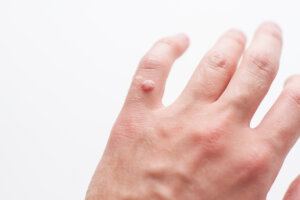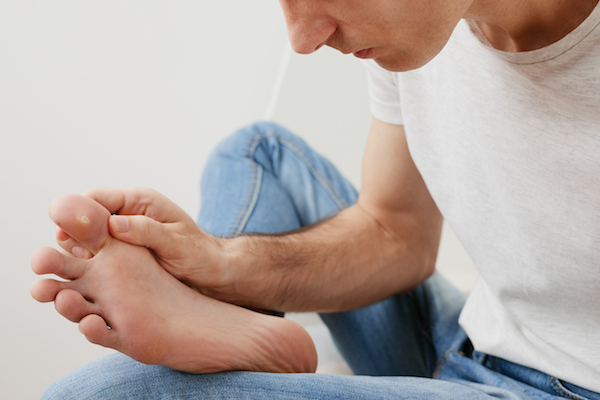Different Types Of Warts: What kind of warts are contagious?
Warts and verrucas are small lumps on the skin that most people have at some point in their life. They can go away on their own but this can take months or even years, most people find them unattractive and want their warts removed. In this post we will discuss what a wart is and what warts are contagious.
What is a wart?

A wart is a hard, noncancerous lump on the surface of your skin. Warts are caused by some types of the human papillomavirus (HPV) infecting the top level surface of your skin.
The virus that causes a wart to form can be passed from person to person or from a surface to a person. It’s also possible for warts to spread from one part of your body to another, meaning that most warts are highly contagious, see below the different types of warts you can get across your body.
The virus that causes a wart to form can be passed from person to person or from a surface to a person. It’s also possible for warts to spread from one part of your body to another, meaning that most warts are highly contagious, see below the different types of warts you can get across your body.
Are all warts contagious?

Most warts aren’t considered very contagious but they can be caught by close skin-to-skin contact over a period of time. The infection caused through warts can be transmitted indirectly from contaminated objects or surfaces.
You are also more likely to get infected if your skin is wet or damaged. After you become infected, it can take weeks or even months for a wart or verruca to form.
This is why people that practise martial arts and go to the swimming baths are more prone to picking up warts due to heavily contacted surfaces with feet and hands, where warts are most commonly found.
Different types of warts:
Most warts appear similar and can be hard to differentiate, however all warts are contagious on different levels, see below the different types of warts:
Common warts
A common wart is a small, grainy skin growth that occurs most often on your fingers and hands. Common warts are rough to the touch, they often have a pattern of tiny black dots surrounding the area, these tiny black dots are small, clotted blood vessels. These warts are easily picked from person to person.
Studies show that one-fifth of common warts disappear within six months, and two-thirds are gone within two years. If your wart doesn’t disappear, or you are finding it unsightly and uncomfortable, you can speak to one of our wart removal specialists today.
Flat warts
Flat warts appear smooth and flat-topped. Flat warts can also be flesh or brownish-yellow-coloured bump the size of a pinhead. These types of warts are commonly found on the face, back of the hands, or legs. Flat warts often appear in large numbers forming groups on the surface of your skin. Flat warts can also be referred to as juvenile warts as they are most commonly found in children and young adults.
Plantar warts
Plantar warts are small growths that often appear on the heels or other weight-bearing areas around or on your feet. The pressure around this area may also cause plantar warts to grow inward beneath a hard, thick layer of skin often described as a callus.
Plantar warts are often harmless and can go away on their own, however, the process of these warts disappearing may take one to two years. If you are finding this type of wart painful or unpleasant to look at then you may want to consider wart removal.
Filiform warts
Filiform warts are quite rare and one of the most popular warts to have removed due to their unique complexion. Filiform warts are made up of long thin projections of skin, giving them a distinctive unusual appearance. These types of warts form around a person’s eyes, lips or nostrils. Filiform warts are more of a technical procedure compared to other wart removal treatment due to their odd placement, they can be removed in several ways – speak to a wart removal specialist today.
Genital warts
Genital warts are formed by a sexually transmitted infection caused by HPV. This virus is passed on through direct skin-to-skin contact with someone through vaginal and anal sex. Most people don’t know when they contracted the virus that causes genital warts (HPV), as the warts can take years to show on the penis or vaginal areas. At Cosmedics our Gential wart treatment is discrete and professional service.
How to prevent spreading of warts
It’s not always possible to fully protect yourself from picking up HPV and developing warts if you are susceptible to them, people with a low immune system are certainly more prone to picking warts up. Regardless to whether you are more likely to pick them up compared to others, there are some ways you can try to prevent the spread of warts, see below:
- Avoid your warts while shaving, as this can help spread easily
- Ensure you clean your hands regularly
- Disinfect all cuts and keep them clean and dry
- Avoid contact with anyone who may have warts
- Don’t scratch or pick at your warts
- Keep your warts dry, as this can help the process of them disappearing
- Consider covering your warts with a plaster
- Don’t use tools like a nail file or nail clipper on both your warts and on unaffected skin
- Wear shoes or socks in public places like pools, gym locker rooms, and showers
- Clean any surfaces that have come in contact with warts, whether your own or someone else’s.
- Don’t share towels or other personal items
When to seek medical help for wart removal?

There may be several reasons why you want wart removal, it may be in a visible area that makes you feel self-conscious, or it may be causing you pain if you are experiencing the following symptoms then you should get in touch with a medical specialist as soon as possible:
- Your wart is bleeding/bleeds on a regular basis
- Your wart changes in appearance
- Your wart spreads
- Your wart causes you significant pain, distress or embarrassment
At Cosmedics our Wart Removal doctor consultations are £50 with one of our highly experienced team.
Prices for treatments carried out in the same appointment as the consultation will include the £50 consultation fee (note: same-day procedures are only undertaken where the procedure is deemed appropriate to do so AND the patient understands the full extent of the costs, risks and potential side effects and is consenting to proceed on that knowledge).
Get In Touch
Please fill in your details and our skin advisors will call you back to give you more information.
You can also add an optional short message.
[elfsight_whatsapp_chat id=”1″]


